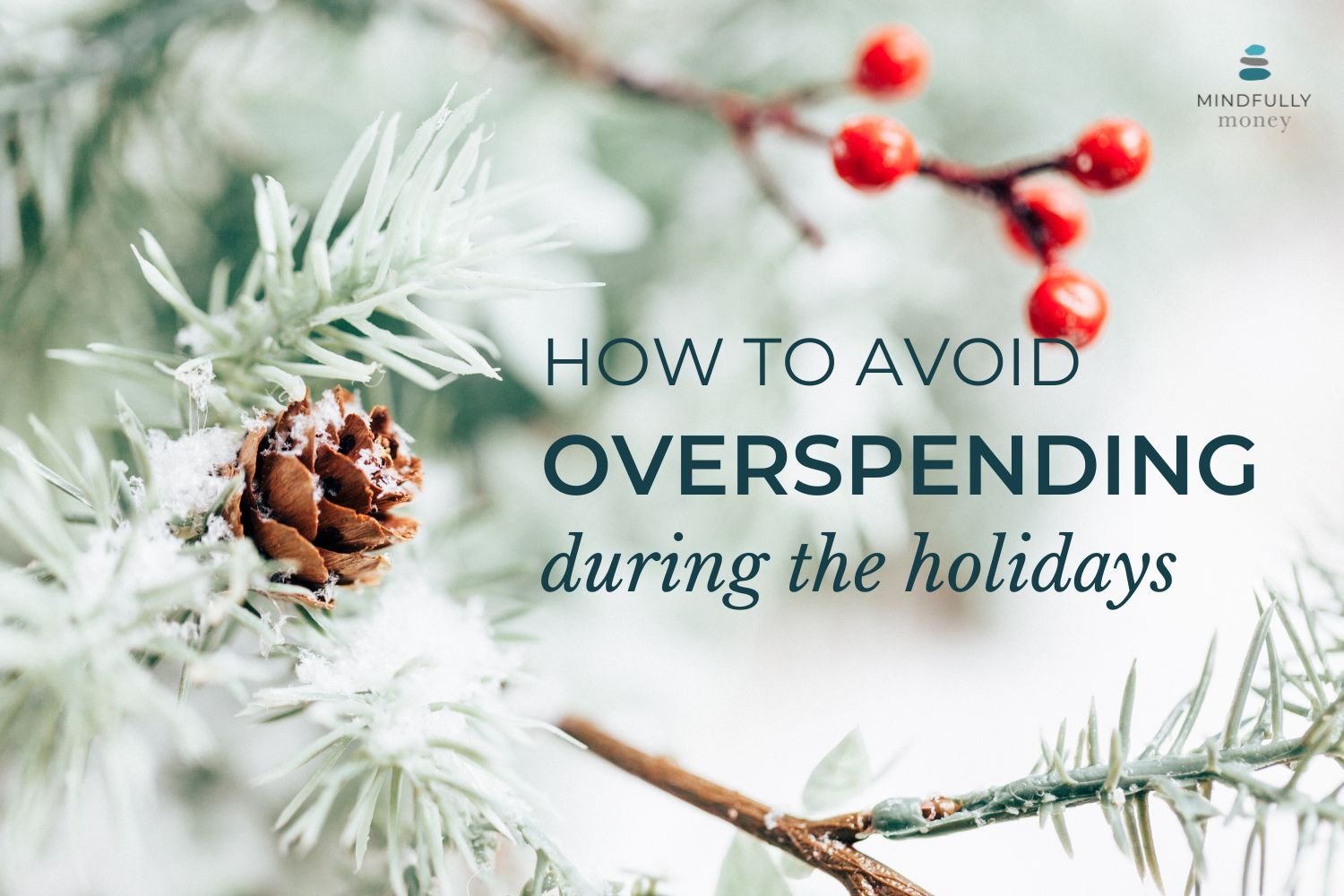How to Stop Living Paycheck to Paycheck
Pin this image for later!
If you’re reading this because you’re living paycheck to paycheck, I just want you to know that you’re not alone and it’s not your fault. Millions of people are struggling to get by for a variety of reasons: the pandemic, medical bills, divorce, job loss, low wages, too much debt, rising cost of living, etc.
When you’re in this situation, it can seem like you’re stuck. You have no idea what to do and it feels like there’s no way out. It’s stressful because you’re constantly worried about making ends meet, and you feel ashamed that you’re even in this situation.
We tell ourselves this story that we are adults and should be able to figure this out. We are smart, hard working, talented people. We know the basics of finance—that you should make more than you spend and save for the future. So why is this so hard to figure out? We feel like failures because we’re not doing better.
It’s totally understandable that you would feel this way.
If this describes you, the first thing I want you to do is forgive yourself. You have enough worries without also feeling like a failure. Many money problems aren’t any one person’s fault. You can’t control the economy or prevent expensive medical catastrophes.
But you should forgive yourself even if you have made some financial mistakes in the past. The thing is, you were doing the best you could with the information you had at the time. We aren’t born with innate financial knowledge and most of us don’t learn it in school. In fact, our brains are programmed in ways that make good financial management extremely challenging (more on that another time…).
So take a deep breath, give yourself a hug, and say out loud “(your name), I forgive you.”
Next, start making a plan. Taking the actions below may not solve all of your financial woes, but it will help give you a greater sense of control.
Steps to Stop Living Paycheck to Paycheck
1. Get clear on your financial picture.
Before you can do anything else, you need to know exactly how much money you have coming in and where it all goes. Getting a complete financial picture helps you identify spending habits and find areas where you’re spending more money than you’d like. It is also the basis for developing a more intentional money plan so you can get ahead and work toward your goals.
You can choose any budgeting or financial management system you want, from apps to spreadsheets, to paper and pencil. The key is to find what works for you. If it’s too hard or annoying, you’re not going to do it.
Take this quiz to help you learn which budgeting method might be a good place to start.
No matter which method you choose, the goal is to know how much you have coming in and know exactly where your money went.
2. Evaluate your expenses
Now that you know where your money goes, you need to look for expenses that can be reduced or eliminated.
I’m a firm believer that you should be able to buy things that make you happy without feeling bad or guilty. However, most of us do not have unlimited resources and will have to make choices about where our money goes. The key is to find things that don’t bring you joy and to cut those first.
When we think about cutting expenses, most of us think about being cheap or frugal: cutting coupons, shopping at five different stores to find the store that has ground pepper for 10¢ less, only buying the cheapest shampoo, and giving up all conveniences and good things in life. Those things certainly can help your budget, but it’s not the smart way to go about reducing expenses.
Instead, focus on expenses that have a bigger and ongoing impact first, such as housing costs, insurance, cable/internet/phone, subscriptions and memberships. You may not be able to cut some of these (you have to live somewhere, right?), but you might be able to reduce these costs by refinancing your mortgage or finding a cheaper cell phone plan. Many people have even found that they can negotiate lower rates.
Next, go through your list of expenses and highlight things that you just don’t care about. Find things that you’d be okay with giving up or reducing, at least on a temporary basis. Start with the ones that will be the easiest to do and be noticed the least.
For example, if you find that you eat out or pick up food multiple times a week, instead of going cold turkey, try reducing it. Go from eating out four times per week to just two. It does not have to be all or nothing.
You do not have to do ALL of these things. Evaluate all expenses in terms of how much they contribute to your quality of life. How important are they compared to the sense of security you’ll gain if you build up your savings or get out of debt? Framing it this way will help you determine what is important to you and what is something you can potentially cut.
How much you decide to cut will depend on how much you’re willing to give up in the short term to feel more secure in the long term.
More Ways to Reduce Expenses:
3. Prioritize your emergency fund.
Having a chunk of money in a high yield savings account will give you more peace of mind than you can possibly imagine. It eliminates the worry that you’ll accidentally spend too much and gives you the confidence that things will be okay if something goes wrong.
You’ll want to have enough money to survive for a while if you lose your source of income AND have enough to pay for unexpected bills like major medical expenses or a new furnace.
All that money you saved in step 2? It should go toward your emergency fund first. Once that’s built up, re-allocate it to retirement savings and then to other goals.
Read More: Why You Need an Emergency Fund
4. Pay off debt the smart way
You don’t need me to tell you that being in debt makes it challenging to get ahead. If you’ve been struggling to get a handle on your debt, what you need is a clear plan. Follow these steps to get out of debt the smart way.
5. Slowly build momentum
Once you eliminate an expense or debt payment, immediately re-allocate that money toward your emergency fund, paying off debt, or saving for something else (especially retirement).
For example, if you pay off your car loan, you can take the amount that you had been paying each month for your car and put it toward something else. Let’s say the car payment was $300 per month. Take that $300 per month and automatically have it sent to your retirement account (or whatever priority you have).
The point is: do NOT just leave it in your checking account to be spent randomly.
6. Take advantage of “extra” money
Any time you get “extra” money over what you normally get in a month, put it toward savings or any other financial goal you are prioritizing. This includes bonuses, tax refunds, gifts, and the third paycheck of 3-paycheck months. It could even include the extra money you receive if you get a raise. The nice thing about these situations is that it is money coming in that wasn’t part of your normal budgeting process.
It’s okay to use at least part of it as a splurge if there’s something you’ve been wanting and didn’t previously have the money for, but don’t just throw it in your checking account with no thought about where it will go. Just be intentional.
7. Automate your savings
When you set up automatic transfers to your savings account (or have a portion of your paycheck deposited directly into your savings account), you don’t have to think about it. It happens whether you remember or not. This is the number one thing you can do to make sure you actually save money. You’re much less likely to spend money and end up with nothing to save at the end of the month.
Learn More: Why You Should Automate Your Savings
8. Get more money
Unfortunately, there’s no way around the fact that in order to get ahead financially, you either have to spend less or earn more. And while we tend to focus on spending less, the truth is that sometimes we just need more money.
Getting a new or additional job might not be the easiest thing, though it is of course a possibility.
But I encourage you to also consider asking for a raise. Women, especially women of color, are paid less than men and we’re suffering for it. We need to be paid what we’re worth.
Ellevest has some great resources on negotiating job offers and asking for raises.
If you’re a man, or other person who is paid what they’re worth (is that a thing?), support your colleagues by sharing what you make and talking up your lower-paid colleagues.
Beyond making more money, think about people in your life that might be able and willing to give you some financial support. Does your rich aunt know that you are struggling and that a few thousand dollars to boost your emergency fund, get enough for a downpayment, or save for retirement would be life changing? Can a grandparent help reduce childcare costs or start a 529 for your child?
Family members are often willing to help, but they sometimes need help understanding what you need. It might be worth having a conversation with them.
Pin this image to save for later!
9. Get help
Working with a financial coach or financial planner can be valuable in situations like this as they may help you figure out how to adjust your cash flow to make your goals possible. Financial help might be expensive, but in the long run, you will hopefully come out ahead. (Just don’t hire a financial advisor who is just trying to sell you whole life insurance or expensive investment products—look for someone who is a fiduciary and/or is fee-only.)
Learn more about my financial coaching services.
These suggestions might not entirely solve all of your financial problems, but the goal is for you to feel more in control of the situation. Sometimes the hardest part of living paycheck to paycheck is the constant worry and fear of the unknown. The steps you take to reduce expenses or make more money might be challenging, but at least you’ll feel more in control of the situation and have hope that you can get through this.






